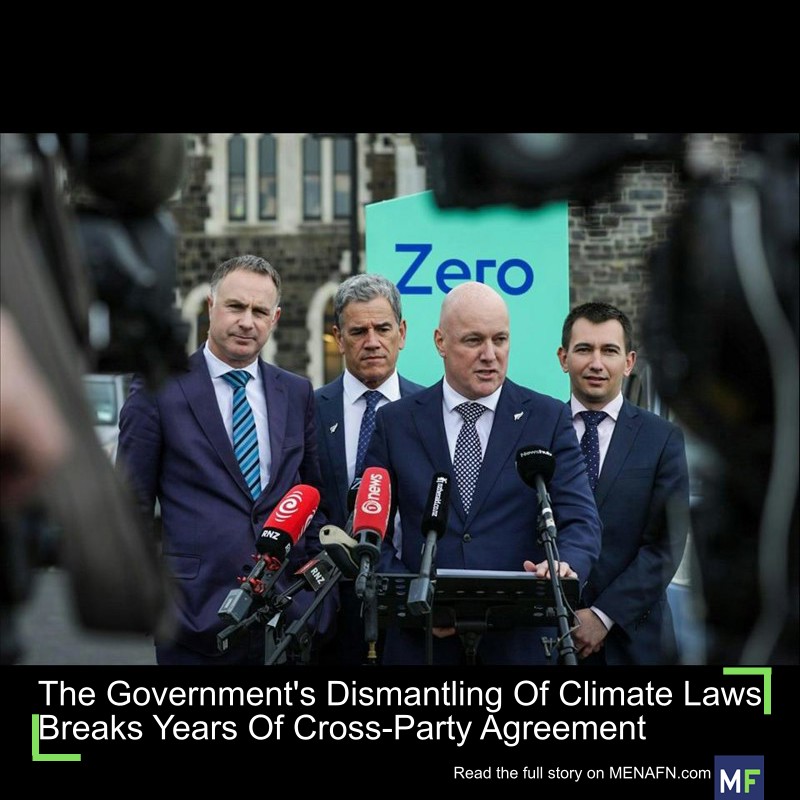
The Government's Dismantling Of Climate Laws Breaks Years Of Cross-Party Agreement
All of the proposals pose serious problems, but the change to the zero-carbon provisions in the Climate Change Response Act 2002 runs counter to the underlying purpose of the act to provide accountability for climate change policy.
The government proposes to simplify emissions reduction plans, which are produced every five years to set out policies and strategies to decarbonise every sector of the economy.
It also wants to remove the Climate Change Commission's role in providing independent advice on emissions reduction plans, and allow more frequent revisions of these plans without public consultation. The changes would also adjust timelines for emissions budgets and reports, and relax deadlines for the government's response.
In earlier research, we explored why climate change is an especially difficult policy issue. One of the chief reasons is that it is a long-term problem that needs action now.
Political systems are not good at addressing long-term problems. As public policy expert Jonathan Boston has demonstrated, democracies suffer from a short-term focus and find it hard to ask voters for commitments to fix a problem that will unfold over decades.
Consequently, countries have often announced targets for emissions reductions for dates that are decades away, and then walked off.
The classic New Zealand example is when Tim Groser, who was minister for climate change between 2010 and 2015, consulted the public about what New Zealand's Paris Agreement target should be, but declared that domestic policies to achieve the target were a separate matter for some other time.
There is a tendency for governments to make grand statements on targets without awkward detail about what we have to do to reach them – or to do as little as possible so as not to upset voters.
But we know that won't work. New Zealand went through a long period of that kind of climate policy making, and it shouldn't go back.
Why we have climate law and a commissionThe solution we settled on for emission targets and policy in 2019 was the Climate Change Response (Zero Carbon) Amendment Act. The act's core elements are targets, budgets, plans and independent advice.
The long-term emissions targets for 2050 (net zero for long-lived greenhouse gases and a recently weakened target for shorter-lived methane) are supported by five-yearly emissions budgets, which show what has to be done in each period to stay on track for the target.
These budgets break down the distant target into a series of closer, smaller and more manageable ones. Then, for each budget period, there is a plan that sets out the policy actions in different sectors that, taken together, should produce a viable path to the necessary emissions reductions.
The Climate Change Commission is part of this policy system to provide transparency and independent judgement.
It formulates advice on targets, budgets and plans (and on a number of other matters), and that advice is made public. The government may or may not follow the commission's advice, but usually must respond, again publicly.
The commission's independence gives it a role different from that of the minister's department. It is more able to take a long-term perspective, and it can ensure that politically difficult aspects of climate policy are not downplayed.
The act's zero-carbon provisions, and especially the commission, help ensure climate policy is formulated in ways that are open, well-informed, systematic, effective and equitable. Consultation during the policy process helps build a broad base of support.
Good processes make better policyZero-carbon laws have been said to have a quasi-constitutional character. They are like the Public Finance Act or the Electoral Act in providing the rules and structure within which New Zealand makes decisions.
The fundamental premise is that good processes, laws and institutions will produce better politics and better policy. The zero-carbon procedures make it harder to do climate policy badly, and easier to do it well.
We should not stop the commission from giving advice on emissions reduction plans, and we do not want it to be reduced to being a mere technical system monitor. Nor should the plans be narrowed in scope, or made subject to the summary process of amendment the government intends, which avoids robust scrutiny.
Public consultation on budgets and emissions reduction plans should not be discarded, and timeframes for ministerial responses should not be relaxed. We need the commission as a source of independent advice to provide transparency about our policy options.
There may well be opportunities for streamlining the statutory procedures. But this must not weaken the system that gives essential structure to the way we tackle the difficulties of climate change.
The law should only be changed after wide consultation and the building of substantial multi-party support in parliament. That is how the zero-carbon law was enacted in the first place.

Legal Disclaimer:
MENAFN provides the
information “as is” without warranty of any kind. We do not accept
any responsibility or liability for the accuracy, content, images,
videos, licenses, completeness, legality, or reliability of the information
contained in this article. If you have any complaints or copyright
issues related to this article, kindly contact the provider above.


















Comments
No comment